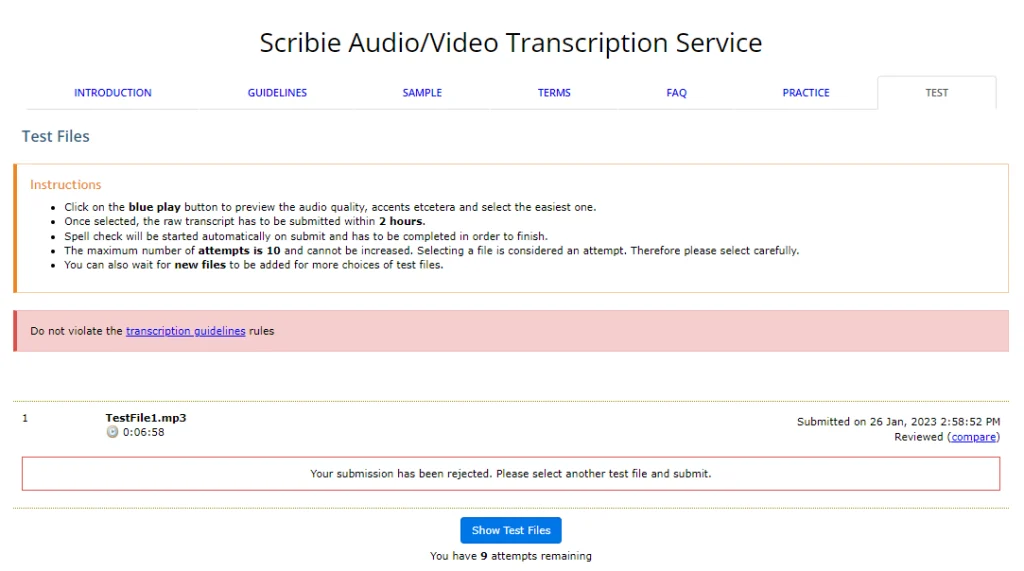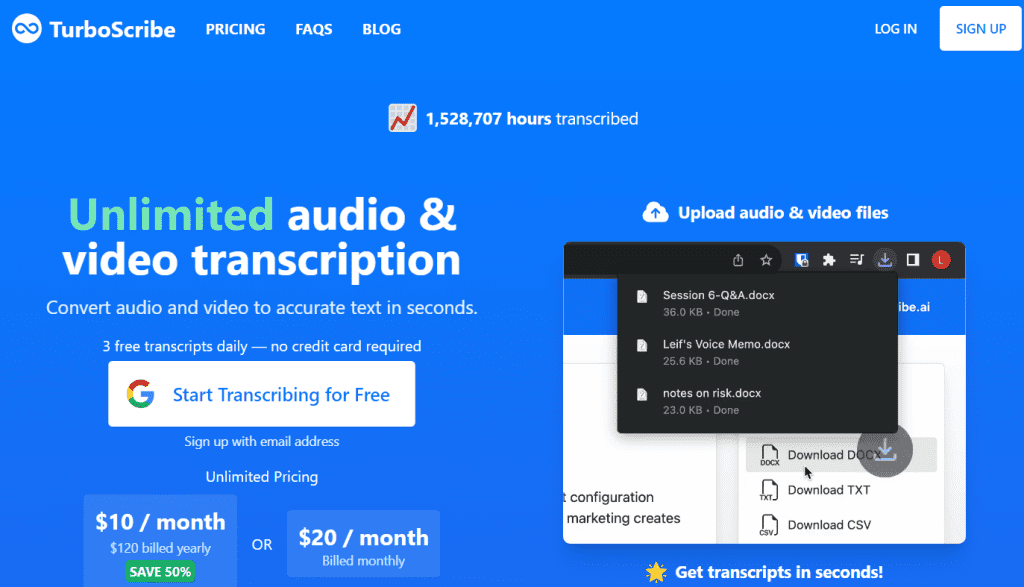Do you know your typing skills can make you money on the side? Well, this is where transcription comes in. This guide tells you everything you need to know to get started as a transcriptionist including the required skills, where to find work, and how much you can expect to earn.
What is Transcription?
Transcription involves converting spoken words or video or audio content by listening and typing them into written text. It requires you to carefully listen to mostly audio or video recordings and type out everything you hear, word for word.
Transcription serves various purposes across different industries:
- Business: Transcribing minutes of meetings, conference calls, and interviews
- Legal: Involves creating written records of court proceedings, depositions, and client interviews. Transcriptions are very important in the legal industry.
- Medical: Documenting patient records, medical research, and healthcare professional notes
- Media: Providing subtitles for videos, creating searchable content for podcasts, and archiving interviews
- Academic: Transcribing research interviews, lectures, and focus group discussions

Transcription Styles
Transcriptionists may work with different types of transcription including the following:
Verbatim
This style requires every utterance, including filler words, false starts and non-verbal sounds to be captured. The goal is to capture how something has been said in a precise transcript that is as close to audio as possible. The verbatim style is often used in research interviews like patient-doctor conversations, speech analysis, legal documents like court hearings, focus group interviews where the emotions of the interviewee play an important role, etc.
Clean
This style requires removing filler words and false starts for improved readability. This is the most used style. The goal is to capture what has been said in a grammatically correct transcript and with good reading flow. The clean style is mostly used in organization/company meetings, municipality meetings, presentations, etc.
Edited
This style requires the transcriptionist to polish the text for grammar and clarity while maintaining the original meaning. Some transcription jobs may also require timestamping, speaker identification, or specialized formatting.

Required Skills for A Transcriptionist
To excel as a transcriptionist, you’ll need to develop and hone several key skills:
- Fast and accurate typing: You should aim for a minimum typing speed of 65 words per minute (WPM) since many professional transcriptionists reach 75-90 WPM. Accuracy is crucial, as errors can change the meaning of the text.
- Be a good listener: You must be able to understand different accents, understand technical jargon, and pick up on nuances in speech.
- Strong in grammar and punctuation: Proper use of grammar, punctuation, and spelling is essential for creating clear and professional transcripts.
- Attention to detail: Transcription requires focus and precision. You’ll need to catch subtle differences in similar-sounding words and accurately transcribe names, numbers, and technical terms.
- Time management: Many transcription jobs have strict deadlines. You’ll need to estimate how long a project will take and manage your time effectively to meet deadlines.
- Familiarity with transcription software and equipment: Knowledge of transcription software like Express Scribe or Transcribe can increase your efficiency. Using a foot pedal for audio control can also significantly boost your productivity. These, however, are not a standard requirement for beginners.
- Research skills: The ability to quickly research and verify information relating to unfamiliar terms or concepts especially in specialized fields is valuable.
- Your Concentration and focus should be excellent: Transcription often involves long periods of intense concentration. You’ll need to maintain focus and accuracy even during extended work sessions.
- Adaptability to different styles: Different clients may have varying style requirements or specialized needs. Being able to adapt to these requirements quickly is important.
- Basic computer skills: Proficiency in word processing software, file management, and internet research is an essential requirement for transcriptionists.
- Discretion and confidentiality: Many transcription projects involve sensitive or confidential information. You must be trustworthy and able to maintain client confidentiality. Most will require you to delete any materials you have transcribed as soon as your transcript is approved.

Platforms To Seek Out Transcription Gigs
Several online platforms offer transcription work for beginners and experienced transcriptionists:
- Rev.com: One of the largest transcription platforms, Rev offers a variety of projects and flexible scheduling. They require a skills test and provide their own transcription software.
- TranscribeMe: Known for its short audio clips, TranscribeMe is often good for beginners. They offer a comprehensive style guide and the opportunity to advance to higher-paying projects.
- GoTranscript: This platform provides work in multiple languages and offers both general and specialized transcription jobs.
- Scribie: Offering both automated and human transcription services, Scribie allows transcriptionists to choose their own hours and projects.
- 3Play Media: Specializing in closed captioning and transcription for video content, 3Play Media often has work available for those with strong English skills.
- Otter.ai: While primarily an AI transcription service, Otter also hires human transcriptionists to review and edit machine-generated transcripts.
- Casting Words: This platform offers a range of audio difficulties and lengths, with pay rates increasing based on your accuracy and experience.
- Daily Transcription: Focusing on the entertainment industry, this platform often has work available for those interested in transcribing TV shows and movies.
- Others include Amberscript, Speechify, Happyscribe, Speakwrite, Allegistrancription, Speechpad, crowdsurfwork.com.
Most of these platforms require you to pass a skills test before you can start working. Others require you to document your education. Also, rates can vary significantly between platforms, so be sure to research and compare before committing to one.
Keep in mind
Unlike other languages, the demand for English transcriptionists is much lower meaning you might have to wait for a while before your test is assigned to your or you’re onboarded. Also, AI transcription tools are competing with human transcrptionists. You might consider incorporating them into your work.

Aside from the platforms, get gigs from…
While online platforms are a great starting point, there are many other sources for transcription work:
- Graduate students: Many graduate students especially in the arts and humanities, conduct interviews or focus groups for their research and need these recordings transcribed. Reach out to university departments or post your services on academic forums.
- Journalists: Both freelance and staff journalists often need interviews transcribed. Contact local news outlets or freelance journalist associations to offer your services.
- Researchers: Academic, market, and scientific researchers frequently require transcription services for interviews, focus groups, and observational studies.
- Podcasters: With the growing popularity of podcasts, many creators need episode transcripts for accessibility and SEO purposes. Reach out to podcast networks or individual creators.
- Small businesses: Many businesses need meeting minutes, conference calls, or video content transcribed. Network with local business groups or chambers of commerce.
- Legal professionals: Law firms and individual lawyers often need depositions, client interviews, and court proceedings transcribed. While legal transcription can require specialized knowledge, it’s often well-paid.
- Medical professionals: Doctors, therapists, and other healthcare providers may need patient notes or research interviews transcribed. Note that medical transcription usually requires additional training and certification.
- Content creators: YouTubers, webinar hosts, and other content creators often need transcripts for their videos to improve accessibility and SEO.

To find these opportunities:
- Use LinkedIn to connect with potential clients.
- Join freelancing platforms like Upwork or Fiverr and create a profile highlighting your transcription services.
- Attend industry conferences or local networking events to meet potential clients in person.
- Create a professional website showcasing your services and expertise.
- Use social media to market your services and share transcription tips to establish yourself as an expert.
Remember, building a client base outside of transcription platforms may take more time and effort initially, but it can lead to higher-paying, long-term relationships with clients.
Gain More Insights and Supercharge Your Hustle
Toot Your Horn: Embracing Self-Promotion for Career Success: Discover how self-promotion and overcoming imposter syndrome can propel your career to new heights. Learn to value and assert your worth.
5 Passive Income Ideas to Cover Your Rent in 2024: Fed up with living paycheck to paycheck? Discover 5 passive income ideas to boost your income effortlessly, and see out the remainder of 2024 with extra cash!











